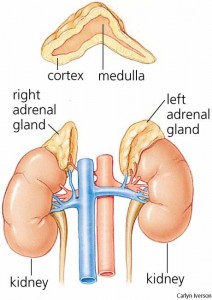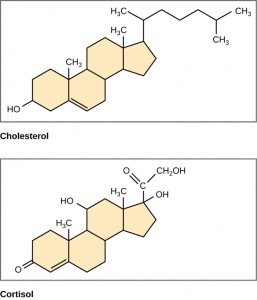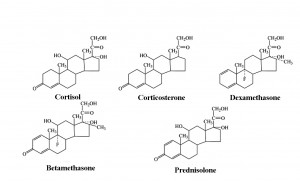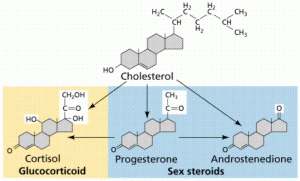Benefits of Bioidentical, or Natural Progesterone
Check Your Hormone Levels
Adrenal Fatigue and the Production of Cortisol
Adrenal fatigue occurs when an individual’s adrenal glands are no longer able to adequately meet the demands of stress. The adrenal glands mobilize our body’s response to every kind of stress (whether it’s physical, emotional or psychological) by producing and releasing hormones that regulate energy levels, heart rate, muscle tone, and other processes that help us deal with daily stressors. One of the major hormones released by the adrenal glands is cortisol, which enables the “fight or flight” response to occur.
Various causes of Adrenal Fatigue
An individual can experience many different kinds of stress throughout their life. For example, when there is an emotional crisis such as the death of a loved one, a physical crisis such as a surg ical procedure, or any stress that is either short term (acute) or long term (chronic), it is the adrenal glands of the endocrine system that mobilize cellular resources to produce the necessary hormones (cortisol, in particular) to facility the body’s best possible response to help the person cope. However, after repeated or chronic stress, the adrenal glands’ ability to respond in an optimal fashion becomes less than optimal. When this happens, an individual experiences adrenal fatigue, which simply means the adrenal glands are physiologically incapable of producing hormones (i.e. cortisol) at optimal levels to meet the demands that stress has placed upon that individual.
ical procedure, or any stress that is either short term (acute) or long term (chronic), it is the adrenal glands of the endocrine system that mobilize cellular resources to produce the necessary hormones (cortisol, in particular) to facility the body’s best possible response to help the person cope. However, after repeated or chronic stress, the adrenal glands’ ability to respond in an optimal fashion becomes less than optimal. When this happens, an individual experiences adrenal fatigue, which simply means the adrenal glands are physiologically incapable of producing hormones (i.e. cortisol) at optimal levels to meet the demands that stress has placed upon that individual.
When a person experiences adrenal fatigue, the adrenal glands still function to some degree, but their level of efficiency is sub-par, and they are not able to produce cortisol at  levels sufficient to maintain a normal, healthy response to stress. Also important to note is the the presence of cholesterol is necessary in order to produce any of the steroid hormones, and progesterone is one of these steroidal hormones. (See below for information on progesterone’s relationship to cortisol.) The glands’ output of regulatory hormones becomes diminished after repeated stressors which demand an immediate physiologic response. When this happens (basically through over-stimulation or extreme demands), the adrenal glands aren’t allowed adequate time to recover or rejuvenate themselves. Again, over-stimulation can be caused either by a very intense single stress or by chronic or repeated stresses that have a cumulative effect.
levels sufficient to maintain a normal, healthy response to stress. Also important to note is the the presence of cholesterol is necessary in order to produce any of the steroid hormones, and progesterone is one of these steroidal hormones. (See below for information on progesterone’s relationship to cortisol.) The glands’ output of regulatory hormones becomes diminished after repeated stressors which demand an immediate physiologic response. When this happens (basically through over-stimulation or extreme demands), the adrenal glands aren’t allowed adequate time to recover or rejuvenate themselves. Again, over-stimulation can be caused either by a very intense single stress or by chronic or repeated stresses that have a cumulative effect.
Who is at Risk for Developing Adrenal Fatigue?
Anyone can suffer from adrenal fatigue at some time in his or her life. An illness, a life crisis, or a continuing difficult situation can drain the adrenal resources of even the healthiest person. However, there are factors that can make an individual more prone to developing tired adrenal glands. These factors include certain lifestyles (poor diet, substance abuse, too little sleep and rest, or too many pressures), a chronic illness or repeated infections (such as bronchitis or pneumonia), or a mother who suffered from adrenal fatigue around the time an individual was born.
Following is a list of common physical conditions and symptoms that may predispose an individual to developing adrenal fatigue:
- Alcoholism and Addiction

- Allergies
- Autoimmune Disease
- Syndrome X and Burnout
- Chronic or Recurrent Infections
- Dental Problems
- Diabetes (Adult Onset)
- Fibromyalgia
- Herpes
- HIV and Hepatitis C
- Hypoglycemia
- Mild Depression
- PMS and Difficult Menopause
- Rheumatoid Arthritis
- Sleep Disorders
Chronic Disease and Adrenal Fatigue
The processes that take place within an individual’s body when they are experiencing a chronic disease (i.e., arthritis, acute or chronic pain, gastroenteritis or cancer) places significant demands on the adrenal glands. As a general rule, if an individual is struggling with a chronic disease, and he or she notice that they no longer feel energized in the morning after a typical night’s sleep, that individual’s adrenal glands are fatigued to some degree. The longer a person’s body and/or mind is exposed to significant stressors, the more severe will be the state of adrenal fatigue.
Synthetic Corticosteroids
With our current medical standard of care treatments, synthetic cortisol (i.e., hydrocortisone, prednisone, etc.) is frequently used for various health problems and in many different types of treatments. Be aware that whenever synthetic cortisol treatments (corticosteroids) are used, the individual being treated will experience a decrease in normal adrenal function. Basically, this is because the individual’s body is able to detect the higher than physiologic levels of corticosteroids (administered through various medical treatment modalities), thereby shutting down the body’s normal production of cortisol.
are used, the individual being treated will experience a decrease in normal adrenal function. Basically, this is because the individual’s body is able to detect the higher than physiologic levels of corticosteroids (administered through various medical treatment modalities), thereby shutting down the body’s normal production of cortisol.
All corticosteroids are designed to imitate the actions of cortisol, which you will recall is the main stress hormone secreted by the adrenal glands. The need for these synthetic corticosteroids arise primarily when an individual’s adrenal glands are not producing the optimal amounts of cortisol for an individual to meet the daily requirements of coping with stress. Yes, I know that this seems to be a vicious cycle, and the solution for stopping the cycle is difficult to treat.
Relationship of Cortisol to Natural Progesterone
I find the world of endocrinology to be particularly fascinating, which is why I was drawn to the specialty of hormone balancing. Each person’s body is a finely-tuned instrument with intricate systems which rely on hormonal communication between individual cells to know how best to help an individual live and function optimally. These interactive, dynamic systems have built-in processes that allow a certain level of compensation, thereby allowing normal bodily functioning even when stressors are present. However, each individual’s endocrine system has a breaking point where the body is no longer able to function. When that happens, an individual will experience unpleasant symptoms. This is the body’s way of alerting an individual to pay attention to his or her physical and emotional needs.
As discussed above, when a person is stressed, physiologically it’s important for the adrenal glands to be able to produce cortisol. In order to make cortisol, the presence of another hormone is critically important. Progesterone is a precursor to cortisol. That means that without Progesterone the adrenal glands are unable to make cortisol.
cortisol. In order to make cortisol, the presence of another hormone is critically important. Progesterone is a precursor to cortisol. That means that without Progesterone the adrenal glands are unable to make cortisol.
In young and middle-aged women (who have not undergone surgical removal of their ovaries), progesterone is normally produced by the ovaries during the latter half (or luteal phase) of their menstrual cycle. Various circumstances, however, can cause a woman not to ovulate regularly, thereby reducing her overall level of progesterone. And, as a woman ages, she tends to ovulate less and less, until there is a complete cessation of ovulation once menopause occurs. This reduction in the level of progesterone significantly impacts a woman’s energy level. There are a host of symptoms that occur with low progesterone, but for this article I am focusing on the impact that low progesterone has on cortisol levels.
In the highly stressed environment of the 21st Century in which we now live, low progesterone levels in females is one of the main factors associated with adrenal fatigue or chronic fatigue syndrome. If you are feeling fatigued, are experiencing symptoms of low cortisol adrenal fatigue, or are wondering if you have low progesterone levels, there is an easy way to do an in-home test to check your hormone levels.
The test kit I most recommend the patients in my clinic for these symptoms is called the Comprehensive Female Profile I (Saliva and Blood Spot) which includes the following twelve (12) separate tests, including ovarian, adrenal and thyroid hormones: cortisol x 4 (for morning, noon, evening and bedtime cortisol levels), Estradiol (E2), Progesterone (Pg), Testosterone (T), Dehydroepiandrosterone Sulfate (DHEAS) in saliva; and Thyroid Stimulating Hormone (TSH), free Triiodothyronine (free T3 or fT3), free Thyroxine (free T4 or fT4), and Thyroid Peroxidase (TPO) antibodies in blood spot.
Check Your Adrenal, Ovarian and Thyroid Function
 Questions?
Questions?
For additional questions, please send me an Email from the Contact Page.
Leave A Reply (No comments so far)
The comments are closed.
No comments yet